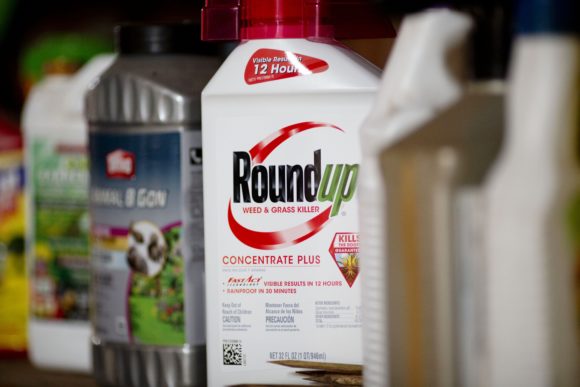While Bayer AG said it took a major step toward wrapping up litigation over its Roundup weedkiller with a settlement of almost $11 billion, the company still faces about 30,000 unresolved cancer claims that could cost billions, and lawyers are vowing even more lawsuits.
“If Bayer and its investors thought the Roundup litigation was wrapped up in a nice, neat ball with this settlement, they are sadly mistaken,” said Tom Kline, a Philadelphia-based plaintiffs’ lawyer who won an $8 billion verdict against Johnson & Johnson last year over one of its anti-psychotic drugs. “We are working hard getting these cases in and ready for trial.”
Roundup litigation was by far the biggest liability that the German chemical giant inherited when it acquired Monsanto for $63 billion in 2018. On Wednesday, Bayer announced settlements totaling $12.1 billion that included as much as $10.9 billion for Roundup, $820 million for toxic-chemical pollution and $400 million related to damage from a dicamba-based herbicide.
But Bayer only managed agreements to end about 95,000 of the 125,000 lawsuits claiming Roundup caused cancer. The others refused to settle, and the number of cases is growing. Last week, attorney Fletch Trammell filed 13 suits on behalf of kids who developed non-Hodgkin’s lymphoma after being exposed to the weedkiller in backyards, parks and playgrounds.
Finger in Dam
“The settlement announcement feels like Bayer is trying to stop a gigantic problem by putting its finger in the proverbial dam,” said Jason Itkin, a Houston based lawyer who won a $70 million verdict against J&J last year. “Every day, new people are diagnosed with Roundup-induced cancer. There will be thousands and thousands of future cases because Bayer is currently still selling this dangerous product.”
The company denies Roundup’s active ingredient, glyphosate, is a carcinogen, a position backed by the U.S. Environmental Protection Agency.
William Dodero, Bayer’s global head of litigation, said at a press conference Wednesday he couldn’t predict how many new Roundup cases will emerge. But the Leverkusen, Germany-based company has made progress in ending its Roundup litigation, resolving all the cases set for trial and those brought by the plaintiffs’ lawyers leading the litigation, Dodero said.
The settlements must still be approved by a federal judge in San Francisco who has some of the cases consolidated before him.
“This litigation has been going on for four years with speculation about settlement for more than a year and plaintiff attorneys have had ample opportunity to bring forward claims,” Chris Loder, a company spokesman, said in an emailed statement. “We’ve now settled approximately 75% of claims, resolved cases with all leaders” on the plaintiffs side and “have an allowance to resolve the remaining cases.”
Shareholders seemed to welcome the agreements. Bayer’s American depositary receipts climbed on the settlement news, gaining as much as as 5%. The ADRs, which represent one-quarter of a regular share, were up 15 cents to $20.54 at 5:19 p.m. in New York.
The company made offers to all the holdouts and is “confident that we can bring this to a final closure in due course,” Dodero said.
Too Low
But Bayer’s settlement offers were insultingly low, according to James Onder, a St. Louis lawyer who held his 24,000 cases out of the settlement.
“The unsettled legal exposure for Bayer could easily exceed tens of billions of dollars as our firms and others have rejected the minuscule offers accepted by some other lawyers,” Onder said in an email. “To act as if one quarter of the Roundup cancer victims don’t exist is nothing more than a flagrant attempt by Bayer to manipulate its stock price and serves as a slap in the face” to those victims, he said.
After Bayer officials refused to make “serious” settlement offers, Trammell said he filed the 13 state court cases on behalf of families who say their children developed non-Hodgkin’s lymphoma from Roundup exposure. Eleven suits were filed in St. Louis last week and the others were file in San Francisco, he said.
The children range in age from five to 17, according to court filings. Most are still battling their cancers, but 13-year-old Jacob Savage of Forks, Washington, died in 2017. Bayer has been hit with at least 20 other suits involving children and Roundup, court dockets show.
“I’m happy they didn’t settle with me and that I can go out and get more good cases,” said Mark Robinson, a California attorney. “These guys need a couple of more verdicts against them to start valuing the cases properly.”
The company lost three damage verdicts totaling more than $191 million. While those cases are on appeal, they spurred a surge in new filings over the past year that led to a plunge in Bayer shares.
Precautions taken by courts during the Covid-19 pandemic — including suspensions of jury selection — may make it difficult for any of the plaintiff laywers to get cases set for trial until at least next year, said Ken Feinberg, who is serving as the chief settlement mediator in the Roundup cases.
“I predict all the remaining cases will settle within a few months,” Feinberg said. “People are going to want their share of this settlement.”
Glenn Norton, a retired Missouri appellate judge who served as a mediator for cases in St. Louis and worked with Feinberg on national settlements, said lawyers whose cases weren’t part of Wednesday’s agreement are still “determined to get them settled, too.”
Norton said “Bayer paid a little more than people thought they would” to resolve most of the Roundup cases, which shows company officials were keen to get as much of the litigation behind them as possible.
The consolidated case is In re: Roundup Products Liability Litigation, MDL 2741, U.S. District Court, Northern District of California (San Francisco).
Was this article valuable?
Here are more articles you may enjoy.



 Chubb CEO Greenberg on Personal Insurance Affordability and Data Centers
Chubb CEO Greenberg on Personal Insurance Affordability and Data Centers  Zurich Insurance’s Beazley Bid Sets the Stage for More Insurance Deals
Zurich Insurance’s Beazley Bid Sets the Stage for More Insurance Deals  Zurich Reveals Beazley Stake After UK Insurer Spurns Bid
Zurich Reveals Beazley Stake After UK Insurer Spurns Bid  Married Insurance Brokers Indicted for Allegedly Running $750K Fraud Scheme
Married Insurance Brokers Indicted for Allegedly Running $750K Fraud Scheme 

